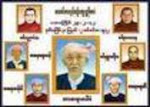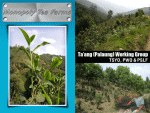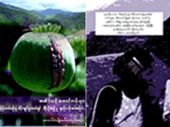n November 13, 2010, Burmese generals surprised the democratic supporters around the world with the release of Aung San Suu Kyi, a Nobel peace laureate and pro-democracy leader of Burma. Her release was warmly welcomed by People of Burma with tears of joy. The release of Aung San Suu Kyi also brings a new hope for democracy and national reconciliation in Burma.

Born on 19th June, 1945 in Rangoon, British Burma, Aung San Suu Kyi is the daughter of General Aung San (a national hero assassinated in 1947) and Khin Kyi (a prominent political figure).
After her release, private or general discussions took place on the political matters of Future Burma among the political activists, political analysts and ordinary citizens. Some critics view that the decision of the military regime could be a starting point for democratization process. On the contrary, some argue that Burma’s democratic transition is in no way guaranteed by Aung San Suu Kyi’s Release. Some have expressed their great concerns about her safety by taking the scenario of Pakistan democratic leader, Benazir Bhutto. These opposing views and concerns point out the following questions:
- Will the decision to release Aung San Suu Kyi by the military generals be actually a starting point for a new chapter of the history of Burma?
- Will there be a probability of any assassination attempts on Aung San Suu Kyi?
- Will the release of Aung San Suu Kyi actually bring a new hope for political dialogue and the end of prolonged and inconclusive political struggle in Burma?
Burma: A country with intra-state conflicts
For more than five decades, Burma has been entrenched in political and armed conflict between the repressive ruling military regime, political opponents, and ethnic groups. The ruling military generals committed grave breaches of the Geneva Convention of 12 August 1949, by the acts of wilful killing, torture or inhuman treatment, extensive destruction and appropriation of property, not justified by military necessity and taking civilians as hostages in armed conflicts with ethnic minority groups.
The ruling military regime also violate the laws or customs of war such as wanton destruction of villages, attack or bombardment of undefended villages, seizure of, destruction or willful damage done to institutions dedicated to religion, charity and education, the arts and sciences, historic monuments as well as the plunder of public or private property. Thousands of villages were destroyed as part of the military campaigns against the ethnic groups. For several decades, crimes against humanity were committed by the junta against the civilian population. Burmese prisons are full of political prisoners.
Persecutions on political, racial and religious grounds were taken place. Monasteries were raided. Churches were burnt down. Monks were shot dead. Women political activists were raped or threatened by some forms of sexual violence. Rape was used a weapon of war in armed conflict zones. These acts result in the displacement of millions of Internally Displaced Persons (IDPs).
Gravely concerned at the continuous violations of human rights in Burma, the Commission on Human Rights passed a resolution 1992/583 on 3 March 1992 to nominate a special rapporteur to establish direct contacts with the military regime and with the people of Burma, including political leaders deprived of their liberty, their families and their lawyers, with a view to examining the situation of human rights in Burma and following any progress made towards the transfer of power to a civilian Government and the drafting of a new constitution, the lifting of restrictions on personal freedoms and the restoration of human rights in Burma. Since then, various UN special envoys, rapporteurs including the UN Secretary-General have visited Burma several times to urge the military regime for all party-inclusive, transparent and national reconciliation.
National Reconciliation and Aung San Suu Kyi
As the political and armed conflicts were entrenched between the repressive military regime, political opponents and ethnic nationalities within the context of constitutional crisis and democracy movement, a ‘Tripartite Dialogue’ among three parties: the military regime, pro-democracy forces (NLD) and the ethnic nationalities, was recommended to resolve Burma’s constitutional crisis, create national reconciliation and initialize the move toward democratization. It highlights the possibility of restoration of trust and confidence and mutual reconciliation after a prolonged inconclusive political struggle through negotiation process and conflict management.
In all conflict situations, the role of Track I leaders who move forward with preparations is an important requirement to generate the political support or ‘will’ for a joint solution. Aung San Suu Kyi fulfils this requirement by calling for dialogue with the junta several times. Some critics argue that Aung San Suu Kyi’s party (NLD) was only interested in negotiation as a means to provide diplomatic cover. In fact, Aung San Suu Kyi and her party have attempted to seek several terms that can be acceptable to the junta side and it was the military junta that has no real interest in reaching agreement at all. Instead, the members of NLD and other democratic forces were arrested and tortured. Aung San Suu Kyi was also put under house arrest during the 15 years of the past 21 years.
For Aung San Suu Kyi, this is not her first time being released from house arrest. At first, she had to spend six years under house arrest until 1995. After her release, she was physically attacked by the members of pro-military organization called Union Solidarity and Development Association (which became Union Solidarity and Development Party in 2010). In early November 1996, she was in her car to visit supporters when a mob of thugs – some throwing stones, some wielding iron bars – surrounded the vehicle and smashed the wind-shield. This was in an area controlled by military forces, who did nothing to intervene.

Aung San Suu Kyi overwhelmed by well-wishes at the games to her home upon release.
Again in September 2000, She was put under house arrest until 2002. After her release, she made a lot of organizing trips around the country despite of harassment and interruptions by the ruling junta and pro-military USDA members. On May 30, 2003, Depayin Massacre took place with 500 unarmed civilians being attacked by military junta and USDA organized thugs. At least 70 people were killed in this massacre. In fact, Aung San Suu Kyi was the victim of a well-organized crime, however, she was put under house arrest again. She had to spend seven years and have been released on November 13, 2010. By taking these events into account, there would be a probability of assassination attempts on her in the future.
Indeed, it could be very difficult to predict the real intent of the decision of the junta to release her, especially after the rigged election on November 7, 2010. Will this decision could actually start a new chapter of the history of Burma? Do the generals have the real intent to start negotiation process among the newly-elected authoritarian government, the democratic forces and ethnic nationalities? Despite of her release, the junta has not made any further announcements regarding the formation of government based on the outcome of election results as well as no formal decision of engagement with the pro-democracy forces yet.
Changing the political climate
By this time, both Aung San Suu Kyi and the military generals need to reassess the political calculus again. Burma is a country with constitutional crisis and conflicts can only be resolved with a ‘Tripartite Dialogue’ among three parties: the military regime, pro-democracy forces (NLD) and the ethnic nationalities. It is obvious that the military regime could not resolve the decades-long political struggle by hand-picking some ethnic groups and holding the authoritarian elections. It is also clear that Aung San Suu Kyi and democratic forces could not resolve the inconclusive struggle without using all types of leverage (normative leverage, coercive leverage and walk-away leverage) and having a sound BATNA (best alternative to a negotiated agreement).
While applying leverage (relative strength) for Negotiation and Dialogue, it is important to use BATNA as a negative inducement. It is an effective signal that its counterparts would be left in a worse position if they do not come to the negotiation table. Developing effective BATNAs could induce the military regime to negotiate with the democratic forces and ethnic groups. On the other hand, these could be useful if there were no prospect for any political dialogue and the pro-democratic forces had to use the replacement mode of democratization. There should be several contingency plans in the case of partial agreement or no agreement at all.
Along with the development of BATNAs and various contingency plans, Track II leaders (highly respected individuals who occupy formal positions in sectors of education, health, business, etc.) should focus on creating a shared vision, building relationships and forming highly-structured reconciliation commissions. Track III leaders (local community leaders, organizers of grass-root NGOs, etc.) should pay attention to the humanitarian needs of the community and attempt to build a broad-based reconciliation process.
Conclusion
From the wider perspective, it could be the greatest moment of the history of Burma if the military leaders decide to engage with pro-democracy forces and ethnic national leaders after the release of Aung San Suu Kyi. However, if the junta decides not to engage, Aung San Suu Kyi and pro-democracy forces should adopt all types of leverage. History tells us that only normative leverage could not bring a successful political dialogue. It must be accompanied by powerful BATNAs and walk-away leverage.
















